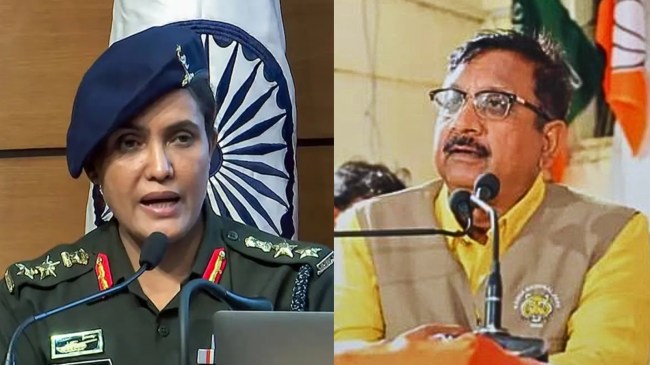Opinion MP Minister’s comments on Sofiya Qureshi crack open indiscipline in the state BJP
In an effort to contain the fallout, the BJP has announced training camps for MLAs in June. These will focus on legal awareness, communication guidelines, and constituency-focused messaging
 It is a test of the political culture the BJP aspires to build -- one that upholds not just development goals but democratic norms
It is a test of the political culture the BJP aspires to build -- one that upholds not just development goals but democratic norms Written by Sumit Kumar Jha
In politics, words shape perception, reflect leadership character, and carry consequences that go beyond momentary outrage. In Madhya Pradesh, recent remarks by senior BJP ministers have stirred up a political storm, raising uncomfortable questions about the party’s internal discipline and future electoral strategy.
The BJP’s 11-day Tiranga Yatra, launched to evoke patriotism in response to Operation Sindoor and Indo-Pak tensions, was meant to be a show of national pride. But the party’s messaging was soon derailed by controversial statements from its own leadership. The controversy erupted when cabinet minister Vijay Shah made communal remarks about Colonel Sofiya Qureshi, a decorated Army officer who was a part of briefings on Operation Sindoor. Shah reduced her to her religious identity — a move that drew widespread condemnation and judicial intervention.
The Supreme Court refused to accept his apology, citing its insincerity, and ordered a Special Investigation Team (SIT) probe. While Shah’s arrest was stayed, the apex court’s warning has brought national attention to the Madhya Pradesh government’s handling of the issue.
Adding to the crisis, MP Deputy Chief Minister Jagdish Devda remarked that “even the Army bows before Prime Minister Modi.” Though he later issued a clarification, the statement blurred the lines between civilian leadership and military neutrality, raising concerns about the politicisation of the armed forces.
Chief Minister Mohan Yadav’s official line — that the government is “complying with court directives”— may satisfy legal procedure, but it fails to address the political and ethical implications. Notably, Shah was absent from the recent cabinet meeting in Indore and was not even sent the agenda, signalling internal distancing. He is reportedly in consultation with the party high command, and decisions about his future have been deferred until the SIT report is submitted on May 28.
While the BJP’s cautious posture may stem from legal and electoral considerations, it has given the opposition, especially the Congress, ample ground to sharpen its attack. The Congress has accused the ruling party of allowing divisive rhetoric to override constitutional decency.
To fully understand the BJP’s restrained response, one must look at the electoral calculus. Vijay Shah remains a key political figure in tribal-dominated Harsud and neighbouring regions. Scheduled Tribes account for 21 per cent of Madhya Pradesh’s population and hold considerable sway in 59 tribal blocks and 47 reserved Assembly constituencies. In the 2023 Assembly polls, the BJP secured 24 of these reserved seats (and 20 more in non-reserved but tribal-majority constituencies), highlighting the critical importance of this vote bank.
Shah’s political career spans over four decades, and despite a similar controversy in 2013 in Jhabua, he was reinstated after just four months, largely to consolidate tribal support. The BJP, which has fewer high-profile tribal leaders compared to the Congress, risks alienating this vital demographic if it replaces Shah too hastily.
Muslim voters, although not a majority, also have strategic influence. In 47 constituencies, their numbers range between 5,000 and 15,000, and they play an important role in around 22 seats. Shah’s remarks may thus alienate moderate voters and undercut the BJP’s narrative of inclusive governance, especially when they are perceived to target a uniformed officer, a symbol of national unity and secular service.
In an effort to contain the fallout, the BJP has announced training camps for MLAs in June. These will focus on legal awareness, communication guidelines, and constituency-focused messaging. While the move is pragmatic, it has been criticised as reactive rather than preventive — a mechanism of damage control rather than a proactive cultivation of responsible leadership.
Party insiders admit that some ministers struggle to balance cultural sensitivity with constitutional duties. The central leadership has reportedly prepared a protocol including public messaging protocols and intra-party communication rules.
The BJP’s consecutive electoral victories in Madhya Pradesh reinforce its political strength. Yet, public support does not equate to a blanket endorsement. Voters are increasingly attuned to issues of dignity, institutional respect, and moral leadership, particularly when it involves the armed forces or women.
The BJP’s governance record — focused on infrastructure, welfare schemes, and grassroots outreach — has drawn praise. But governance is as much about tone as it is about policy. In a state with a significant tribal and minority population and a long tradition of military service, words carry weight and consequences. The upcoming SIT report will shape the immediate legal course, but the political cost is already evident. This moment demands not just compliance but conviction. A temporary suspension or public censure of Shah would demonstrate that the party distinguishes between electoral necessity and ethical responsibility.
Ultimately, this is more than a PR crisis. It is a test of the political culture the BJP aspires to build — one that upholds not just development goals but democratic norms. The question is whether the party will act before damage turns into disillusionment. The days ahead will reveal whether the BJP can convert a controversy into an opportunity for introspection or allow silence to speak louder than principles.
The writer is a research associate at Madhya Pradesh Institute of Social Science and Research





